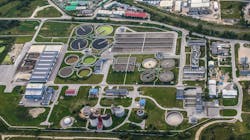Maryland officials have announced that it has approved more than $23 million in grants and loans for wastewater infrastructure projects that reduce water pollution and save energy.
“These are smart investments to protect public health and the environment,” said Maryland Environment Secretary Ben Grumbles. “Moving ahead with the Piscataway sewage treatment plant bio-energy project and upgrading sewer and wastewater treatment systems will help us to green and grow the state’s economy and lead in the race to protect and restore Chesapeake Bay watersheds.”
The following projects were approved:
Piscataway Wastewater Treatment Plant Bio-Energy project – Prince George’s County
A $15 million Water Quality State Revolving Loan Fund loan to the Washington Suburban Sanitary Commission, in addition to previous loans of more than $128 million and a previous $3 million Energy Water Infrastructure Program grant, will help fund the design and construction of bio-energy facilities at the Piscataway Wastewater Treatment Plant, which will receive sludge from other WSSC wastewater treatment plants.
The project will include a process to precondition sludge prior to anaerobic digestion, an anaerobic digestion facility and a facility to produce dewatered “Class A biosolids,” which can be beneficially reused as fertilizer on farms and sold to home gardeners. Also, a combined heat and power facility will be built to capture the biogas from the digestion to produce steam and electricity for the plant. Odor control, process water treatment, generators, and boilers are also included in the project.
The project will recover renewable energy and reduce energy, chemical and sludge disposal costs. Energy efficiency and the use of renewable energy and biogas can help the Chesapeake Bay by reducing nitrogen pollution and greenhouse gas emissions.
WSSC Sewer Basin Reconstruction Program —Prince George’s County
Bay Restoration Fund grants totaling $7,747,811 to the Washington Suburban Sanitary Commission will help fund a broad program to repair, replace, and rehabilitate sewers and manholes on or near state, local, and county road right-of-ways throughout Prince George’s and Montgomery counties.
These grants are for improvements in the Beaverdam Sewer Basin, the Northwest Sewer Basin, the Parkway Sewer Basin, and the Piscataway Sewer Basin, all in Prince George’s County. These projects aim to reduce runoff that is exacerbated by increased precipitation or flooding events.
Rock Hall Wastewater Treatment Plant Enhanced Nutrient Removal Upgrade project – Kent County
A $637,000 Bay Restoration Fund grant to the Town of Rock Hall will help fund the design of an Enhanced Nutrient Removal (ENR) upgrade of the town’s wastewater treatment plant. After the upgrade, the facility will reduce its nitrogen discharge by 83 percent and its phosphorus discharge by 70 percent, significantly reducing the amount of nutrients to Gray’s Inn Creek and ultimately the Chesapeake Bay.
Excessive amounts of nutrients such as nitrogen and phosphorus lead to lowered levels of oxygen needed to support aquatic life in waterways, including the Chesapeake Bay. ENR upgrades of wastewater treatment plants are a critical component of Maryland’s Chesapeake Bay restoration plan.



